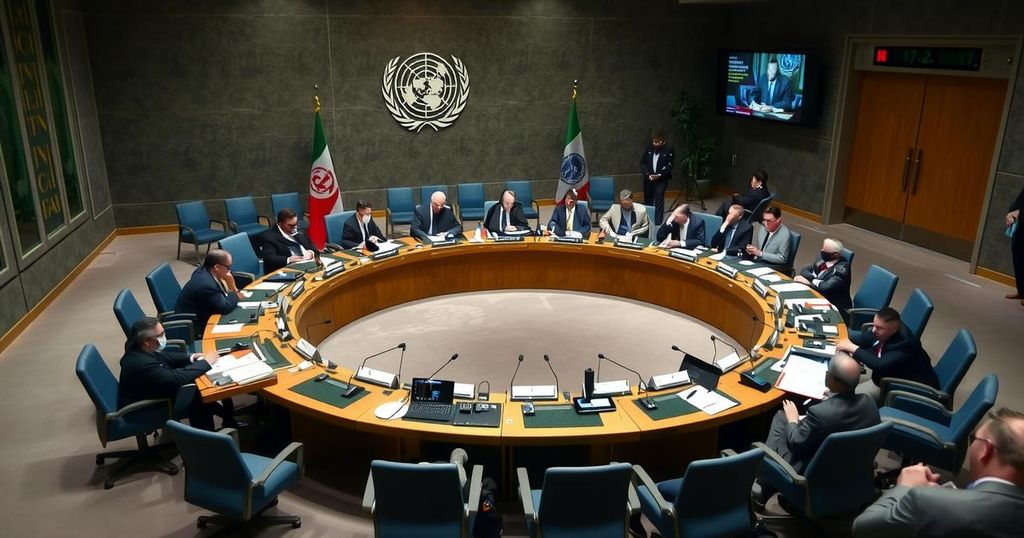UN Security Council to Address Escalating Tensions Following Israel-Iran Conflict
The UN Security Council is set to hold an emergency meeting at Iran’s request following a wave of violence between Iran and Israel. Iran vows to respond to Israeli airstrikes, while Iraq condemns Israel’s military actions as violations of its sovereignty. The situation escalates with casualties reported in Lebanon due to Israeli strikes, prompting warnings from Iranian military leaders.
The United Nations Security Council convened an emergency meeting at Iran’s request following recent escalations in military hostilities between Iran and Israel. This meeting, scheduled for Monday, is supported by China, Algeria, and Russia, as tensions escalate in the Middle East after Israel conducted airstrikes on Iranian military installations in response to an earlier attack by Iran on October 1. In light of Israel’s actions, Iranian Foreign Ministry Spokesperson Esmaeil Baghaei announced that Iran would utilize all available means to respond to the aggressions against its military sites. Additionally, Israel’s recent airstrike on the southern Lebanese city of Tyre has resulted in five fatalities and ten injuries, according to Lebanon’s health ministry, which termed the situation provisional due to ongoing efforts to clear the rubble. Moreover, Iraq has formally lodged a complaint with the United Nations, condemning Israel’s use of Iraqi airspace for its military operations against Iran. Iraqi government spokesperson Basim Alawadi denounced this violation of Iraq’s sovereignty, referring to the occurrence as an affront to national integrity. The commander of Iran’s Revolutionary Guards, Hossein Salami, issued a stark warning to Israel, stating that it would face severe repercussions for its attacks. Salami deemed Israel’s military operations as a failure, indicative of its miscalculations, and ominously forewarned of consequences that would be unimaginable for the nation as it concurrently confronts groups aligned with Iran in Gaza and Lebanon. The UNSC meeting represents a critical moment amidst the ongoing conflict, following a series of violent incidents including further Israeli strikes on Lebanon, which have collectively resulted in heightened regional instability.
The recent escalation of tensions between Israel and Iran stems from a long-standing conflict over military actions and regional influence. The backdrop includes a series of military strikes from both sides, with Israel targeting Iranian facilities in retaliation for perceived threats. The complex dynamics are further complicated by the involvement of neighboring countries such as Lebanon and Iraq, highlighting broader geopolitical conflicts. The UN Security Council’s intervention underlines the seriousness of these hostilities and its potential implications for regional stability and international relations.
In conclusion, the situation surrounding the Israeli-Iranian conflict is marked by escalating violence and diplomatic tensions, necessitating urgent attention from the international community. The UNSC’s emergency meeting reflects the gravity of ongoing military confrontations, while statements from Iranian officials underscore their intent to respond decisively to Israeli actions. As the situation develops, the potential for further conflict remains a significant concern for regional and global security.
Original Source: www.france24.com




Post Comment